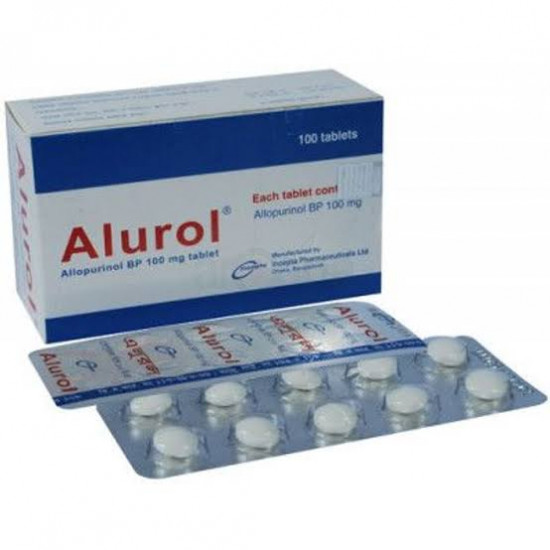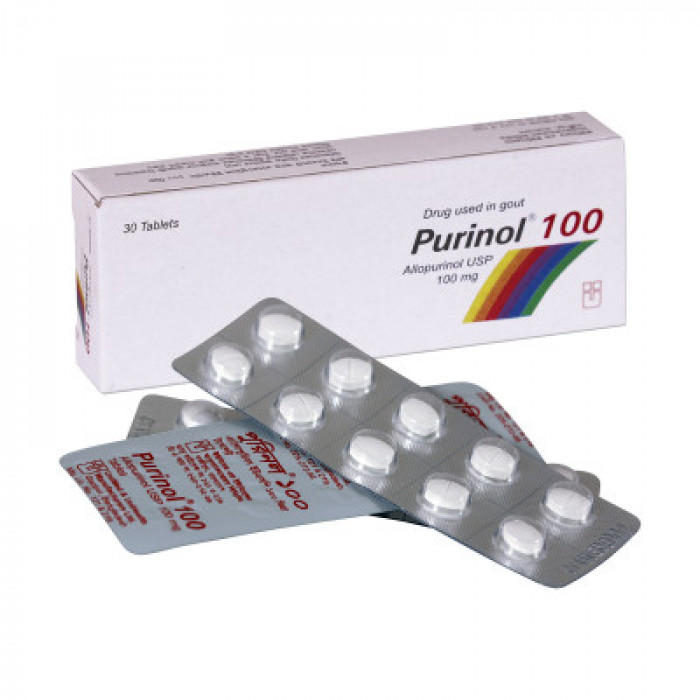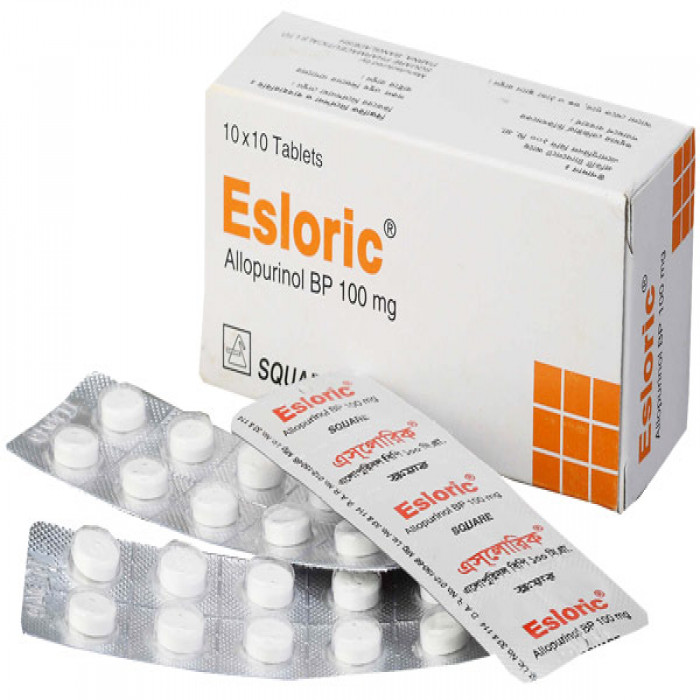
✔ 100% Authentic Product
👁️ Currently Viewing 2126
Type: Tab. Manufacturer/Distributor: Bio-pharma Generic Name: Allopurinol 100mg
Discount
Price: ৳ 40
MRP:
৳
42.2
5%
Off

100% Genuine Products, Guaranteed

Safe & Secure Payments, Always

Fast, Secure & Efficient Delivery

Proper Packaging
 Cash on Delivery - All over Bangladesh
Cash on Delivery - All over Bangladesh Regular Delivery - 12-24 Hours, Dhaka City* Charge Tk.39-59
Regular Delivery - 12-24 Hours, Dhaka City* Charge Tk.39-59 Regular Delivery - 24-48 Hours, Other Cities* Charge Tk.99-110
Regular Delivery - 24-48 Hours, Other Cities* Charge Tk.99-110
 ফ্রি ডেলিভারিঃ - ৯৯৯ টাকা+ অর্ডারে, ঢাকা
শহরে
ফ্রি ডেলিভারিঃ - ৯৯৯ টাকা+ অর্ডারে, ঢাকা
শহরে ফ্রি ডেলিভারিঃ - ২৯৯৯ টাকা+ অর্ডারে, ঢাকার
বাহিরে
ফ্রি ডেলিভারিঃ - ২৯৯৯ টাকা+ অর্ডারে, ঢাকার
বাহিরে
100% Genuine Products, Guaranteed
Safe & Secure Payments, Always
Fast, Secure & Efficient Delivery
Proper Packaging
 Cash on Delivery - All over Bangladesh
Cash on Delivery - All over Bangladesh Regular Delivery - 12-24 Hours, Dhaka City* Charge Tk.39-59
Regular Delivery - 12-24 Hours, Dhaka City* Charge Tk.39-59 Regular Delivery - 24-48 Hours, Other Cities* Charge Tk.99-110
Regular Delivery - 24-48 Hours, Other Cities* Charge Tk.99-110 ফ্রি ডেলিভারিঃ - ৯৯৯ টাকা+ অর্ডারে, ঢাকা
শহরে
ফ্রি ডেলিভারিঃ - ৯৯৯ টাকা+ অর্ডারে, ঢাকা
শহরে ফ্রি ডেলিভারিঃ - ২৯৯৯ টাকা+ অর্ডারে, ঢাকার
বাহিরে
ফ্রি ডেলিভারিঃ - ২৯৯৯ টাকা+ অর্ডারে, ঢাকার
বাহিরে
✅ Description:
Introduction
Goutex is a medicine used to treat and prevent gout. Gout happens when there is too much uric acid in your body and it forms into crystals which can appear around your joints and kidneys and cause pain. This medicine helps to keep uric acid levels low. Goutex should be taken after food. You should keep taking it as recommended by your doctor even when you are not having a gout attack. If you stop, your symptoms may get worse because more crystals form in your joints and kidneys. You can help yourself by making some changes to your diet and drinking plenty of fluids. Some of the common side effects of this medicine are rash, nausea, and diarrhea. Your doctor may help with ways to reduce or prevent these symptoms. Some people may get a severe allergic reaction which needs urgent medical attention. Talk to your doctor straight away if you get symptoms of liver disease including nausea that does not stop, yellowing skin or eyes, or dark urine. To make sure it is safe for you, before taking this medicine, let your doctor know if you have or have had heart failure, heart problems, stroke, kidney or liver disease or thyroid problems. Do not use this medicine if you are pregnant or breastfeeding. Check with your doctor. You will be asked for regular blood tests to check that your liver is working properly.
Uses of Goutex
- Gout
Side effects of Goutex
Common
- Skin rash
- Diarrhea
- Nausea
How to use Goutex
Take this medicine in the dose and duration as advised by your doctor. Swallow it as a whole. Do not chew, crush or break it. Goutex is to be taken with food.
How Goutex works
Goutex is a xanthine oxidase inhibitor. It works by decreasing blood uric acid, which is the chemical that causes gout.
What if you forget to take Goutex?
If you miss a dose of Goutex, take it as soon as possible. However, if it is almost time for your next dose, skip the missed dose and go back to your regular schedule. Do not double the dose.

Quick Tips
- Your doctor has prescribed Goutex to reduce episodes of gout attack.
- Take Goutex with food to avoid stomach upset.
- Take plenty of fluids (2-3 litres) daily while on Goutex.
- Notify your doctor if you develop a rash. This could be a sign of allergy and should go away on discontinuing Goutex.
- When you first start taking this medicine, you might have more gout attacks. Do not stop Goutex on having an acute attack of gout as that could make an attack worse.
- Your doctor may check your liver function before starting treatment and regularly thereafter. Inform your doctor if you notice yellowing of eyes or skin, dark urine, or stomach pain.
- Do not consume alcohol while taking this medicine as it may cause your gout to flare up.

Brief Description
Indication
Adult: PO Gout; Hyperuricaemia Mild: 100 mg/day PO initially; increased weekly to 200-300 mg/day Moderate to severe: 100 mg/day PO initially; increased weekly to 400-600 mg/day Prevention of hyperuricaemia associated w/ chemotherapy treatment or enzyme disorders 600-800 mg/day, starting 2-3 days before cancer treatment. Hepatic impairment: Dose reduction may be needed. Monitor liver function regularly.
Administration
May inhibit the metabolism of mercaptopurine and azathioprine; reduce dose of mercaptopurine and azathioprine when given w/ allopurinol. May increase effect of warfarin and other coumarin anticoagulants. Increased excretion of the oxipurinol (metabolite) w/ salicylates or uricosuric agents. Increased toxicity w/ thiazide diuretics, some antibacterials, other antineoplastics, ciclosporin, some sulfonylurea antidiabetics, theophylline and vidarabine.
Adult Dose
Ensure adequate fluid intake. Prophylactically with an anti-inflammatory or colchicine for at least 1 mth. Withdraw immediately when sensitivity (skin rash, etc) appears. Pregnancy, lactation. Hepatic and renal impairment. Lactation: Agent is distributed into breast milk; use with caution.
Renal Dose
Allopurinol is an inhibitor of the enzyme xanthine oxidase which converts hypoxanthine to xanthine then uric acid. The reduced production of uric acid relieves all symptoms associated with hyperuricaemia and gout. Inhibition of xanthine oxidase leads to accumulation of its substrates hypoxanthine and xanthine but since their renal clearance is more than 10 times that of uric acid, there is no risk of nephrolithiasis.
Mode of Action
Administration Should be taken with food. Take immediately after meals.
Precaution
Hyperuricaemia, Uric acid nephropathy, Cancer therapy-induced hyperuricaemia, Gout, Recurrent renal stones
Side Effect
Renal impairment: Haemodialysis: Administer dose after session or administer 50% supplemental dose. CrCl (ml/min) 10-20 200 mg daily. <3 100 mg daily at extended intervals. 3-10 100 mg daily.
Pregnancy Category Note
1-10% Rash (1.5%),Nausea (1.3%),Renal failure (1.2%),Vomiting (1.2%) Frequency Not Defined Amblyopia,Arthralgias,Blood dyscrasias,Bronchospasm,Cardiovascular abnormalities,Cataracts,Confusion,Decrease in libido,Dizziness,Ecchymosis,Electrolyte abnormalities,Epistaxis,Foot drop,Hematuria,Hepatotoxicity,Hypotonia,Iritis,Kidney function abnormality,Macular retinitis,Malaise,Neuritis,Pharyngitis,Pruritus,Skin edema,Stevens-Johnson syndrome,Sweating,Tinnitus Potentially Fatal: Stevens-Jonhson and/or Lyell's Syndrome (urticaria, fever, lymphadenopathy, arthralgia). Occasionally, thrombocytopaenia, agranulocytosis and aplastic anaemia.
Interaction
Hypersensitivity; acute attack of gout.
⚠️Disclaimer:
At ePharma, we’re committed to providing accurate and accessible health information. However, all content is intended for informational purposes only and should not replace medical advice from a qualified physician. Please consult your healthcare provider for personalized guidance. We aim to support, not substitute, the doctor-patient relationship.









